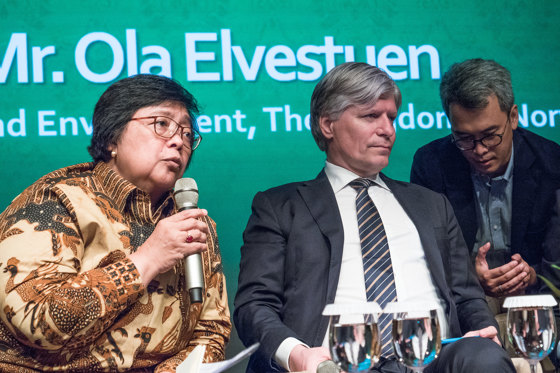Logging moratorium in Indonesia's forests made permanent
Historical archive
Published under: Solberg's Government
Publisher: Ministry of Climate and Environment
News story | Date: 13/08/2019
Indonesia is making the logging moratorium in primary forest and carbon-rich peatlands permanent. The ban covers 66 million hectares, which is larger than the combined area of Germany and Italy. The ban is signed by President Joko Widodo and was announced by Environment and Forestry Minister, Siti Nurbaya Bakar.
-Indonesia is about to become a global leader in the fight against deforestation. The country has reduced deforestation and is taking a crucial step for further reductions with this ban, says Norway's Minister for Climate and Environment, Ola Elvestuen.

A temporary two-year moratorium was first introduced in 2011 during the government of former President Yudhoyono. Since then, the moratorium has been renewed three times, but not been made permanent until now.
-The last report from the Intergovernmental Panel on Climate Change (IPCC) shows that the world must protect natural forests and make significant reductions in deforestation if we are to limit global warming and avoid dangerous climate change. Indonesia's actions are therefore extremely important for the global climate, says Elvestuen.
Since President Joko Widodo came to power in 2015, the Indonesian government has introduced a number of reforms that aim to reduce deforestation. Emissions from deforestation and forest degradation in Indonesia was 7.4 million tons CO2 lower in 2016/2017 than the average during the former decade. Preliminary reports from independent forest monitoring units suggest that this positive development continued in 2017/18. The deforestation rate in Indonesia is now at its lowest level since 2003.
Norway has had a close partnership with Indonesia since 2010 to help Indonesia reach its ambitions to reduce deforestation.
–Norway has supported Indonesia through all these years and we now see that our efforts give results, says Ola Elvestuen.
Facts Indonesia/Norway forest partnership
Indonesia's tropical rainforest is the third largest in the world, after the Amazon and the Congo Basin forest.
Indonesia's annual emissions of greenhouse gases are estimated to 1.8 billion tons of CO2 when emissions from deforestation and destruction of carbon-rich peatlands are accounted for. This places Indonesia amongst the world's top 10 emitting nations.
Estimates show that Indonesia's forest and peat fires during a six month period in 2015 may have caused emissions of 1,6 billion tons of CO2.
Indonesia has a national goal of reducing its greenhouse gas emissions by 2020 with 26% and by 2030 with 29% by its own efforts. With international support, Indonesia raises its ambitions to a 41% reduction of emissions. In 2019, Indonesia confirmed that climate change emissions from deforestation in 2017 were reduced. This means that Norway can pay Indonesia for reduced emissions from deforestation for the first time since the climate and forest partnership started.
Norway entered into a climate and forest partnership with Indonesia in 2010, after Indonesia had launched ambitious climate change goals. Norway promised to contribute with up to one billion USD if Indonesia delivered results in terms of reduced emissions from deforestation and forest degradation. The Letter of Intent between Norway and Indonesia outlines a number of institutional and regulatory reforms that Indonesia will make. The reform work has accelerated during the last two years. Last year, President Joko Widodo signed a moratorium against the expansion of palm oil plantations. Indonesia has also decided to protect all remaining peat from drainage and exploitation. This decision may reduce emissions with several billion tons of CO2 in the coming years.
There are many signs that the reforms have started to work. Deforestation numbers released by the Indonesian government show that the emissions from deforestation and forest degradation were reduced with 7,4 million tons CO2 in 2017 compared to a ten year historical average. Numbers from the independent monitoring unit Global Forest Watch, show that deforestation continued to go down in 2018. According to this analysis, the loss of primary forest was 40% lower than the average for the years 2002-2016. In very carbon-rich peatlands the development is even more positive and shows a reduction of 80% in emissions compared to the average for 2002-2016.
- Norway has pledged to support Indonesia with up to 1 billion USD (with the 2010 exchange rate for NOK to USD). 80% of this amount will be results-based payments.
- About 200 million USD is set aside for investments in programs that can help Indonesia reach the results-based phase.
- So far, approximately 13,5% of the funds, or 808 million NOK, has been paid to Indonesia.